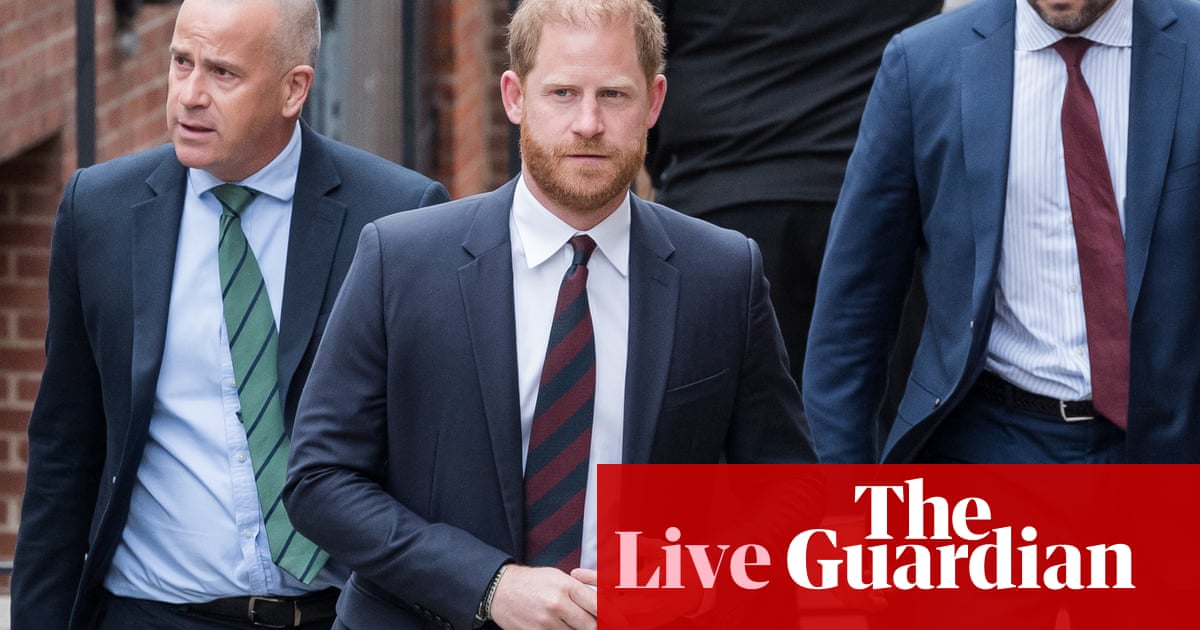The Duke of Sussexwill shortly find out whether or not he’s won a legal case over his security arrangements while in the UK.
Prince Harry’s taxpayer-funded protection was effectively downgraded in 2020,after he stopped being a working royaland moved abroad with his wife Meghan,the Duchess of Sussex, to raise their son, Archie.
In March 2020, the couple moved from Vancouver to California, where their daughter - Lilibet - was born a year later.
Harry has argued that it is too dangerous to bring his family back to the UK without sufficient police protection and has taken the government to court.
As he is no longer a working royal, the duke’s security in the UK is now made on a case-by-case basis decided by the executive committee for the protection of royalty and public figures, known as Ravec.
Harry’s lawyers have accused Britain’s Home Office, or interior ministry, of “singling him out” for “inferior treatment” andsay that his safety, security and life are at stakein his appeal against arrangements for his security while in the UK.
The Duke of Sussex has previously said he faces a greater risk than his late mother, with “additional layers of racism and extremism”.
He also believes his family faces an “international threat” and has already highlighted that al Qaida had called for him to be killed after Ravec’s decision.
The Home Office is opposing Harry’s security appeal on Ravec’s behalf as it has legal responsibility over its decisions.
Sir James Eadie KC, for the Home Office, has said Ravec’s decision for a “bespoke” arrangement was seen to have “positive advantages” as a flexible, tailored approach better suited to the duke’s circumstances.
The judges, Sir Geoffrey Vos, Lord Justice Bean and Lord Justice Edis, will give their decision at London’s court of appeal at 2pm today.
We’re expecting the court of appeal ruling any minute now. It was meant to be delivered around 2pm. You can watch it via this YouTubelink.
– September 2021
Prince Harry’s legal team first disputed Ravec’s ruling in September 2021. It came after an incident in London in June 2021, when the Duke of Sussex returned to the UK for theunveiling of a statue of his late mother, Diana, Princess of Wales, and his car was reportedly chased by photographers.
– December 2023
The full hearing begins, withPrince Harrysaying in a statement that the UK is a place he wants his children “to feel at home” - but said this was not possible under the new downgraded security arrangements.
- February 2024
The retired high court judge Sir Peter Lane concluded that Ravec’s approach to security wasnot irrational nor procedurally unfairand Harry’s case was dismissed.
At the time, a spokesperson for the prince said he intended to challenge that judgment, adding that Harry “hopes he will obtain justice from the court of appeal”, the second highest court in the UK (below the supreme court).
– April 2024
The Duke of Sussex lost an initial attempt to appeal against the high court decision to back a reduction in his level of personal security when visiting the UK.
– June 2024
Prince Harry was given the go-ahead by the court of appeal to challenge the high court decision after he was able to make his case to the court of appeal directly.
- April 2025
A two-day hearing at the Court of Appeal begins.
As we mentioned in the opening post, at a two-day hearing last month, barristers for Prince Harry told the court of appeal that he was “singled out” for “inferior treatment” and that his safety, security and life were “at stake”.
Prince Harry was in court for the hearing, but was not compelled to say anything. Instead, he listened to the government set out its position, reportedly writing in a small notepad and on Post-it notes, which he handed over to his legal team.
The details of the Duke of Sussex’s current security arrangements, and the levels he would like to receive in future, were not disclosed in court for security reasons.
More sensitive information was discussed in a closed hearing, which concluded on 9 April, without any journalists there.
The Duke of Sussexwill shortly find out whether or not he’s won a legal case over his security arrangements while in the UK.
Prince Harry’s taxpayer-funded protection was effectively downgraded in 2020,after he stopped being a working royaland moved abroad with his wife Meghan,the Duchess of Sussex, to raise their son, Archie.
In March 2020, the couple moved from Vancouver to California, where their daughter - Lilibet - was born a year later.
Harry has argued that it is too dangerous to bring his family back to the UK without sufficient police protection and has taken the government to court.
As he is no longer a working royal, the duke’s security in the UK is now made on a case-by-case basis decided by the executive committee for the protection of royalty and public figures, known as Ravec.
Harry’s lawyers have accused Britain’s Home Office, or interior ministry, of “singling him out” for “inferior treatment” andsay that his safety, security and life are at stakein his appeal against arrangements for his security while in the UK.
The Duke of Sussex has previously said he faces a greater risk than his late mother, with “additional layers of racism and extremism”.
He also believes his family faces an “international threat” and has already highlighted that al Qaida had called for him to be killed after Ravec’s decision.
The Home Office is opposing Harry’s security appeal on Ravec’s behalf as it has legal responsibility over its decisions.
Sir James Eadie KC, for the Home Office, has said Ravec’s decision for a “bespoke” arrangement was seen to have “positive advantages” as a flexible, tailored approach better suited to the duke’s circumstances.
The judges, Sir Geoffrey Vos, Lord Justice Bean and Lord Justice Edis, will give their decision at London’s court of appeal at 2pm today.
